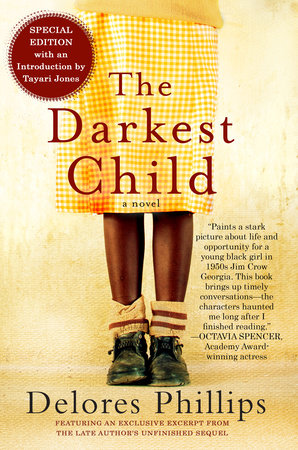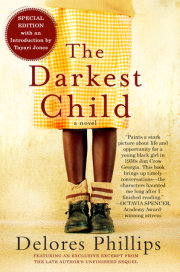Chapter OnePakersfield, Georgia 1958Mama washed the last dish she ever intended to wash. I alone witnessed the event, in silence. It was on a Friday—a school day—but instead of sitting in a classroom, I was standing in unfamiliar surroundings, the home of my mother’s employers, stunned by the wealth around me. As I watched my mother through unwavering peripheral vision, something in her glances at me seemed to say, “Tangy Mae, this will be your life. Grab an apron and enjoy it.”
Domestic servitude was not what I desired for myself, but she had only to speak and I would do anything she asked. It was my obligation to obey her, though I did not want to be like my elder brothers, Harvey and Sam, who seemed to breathe at our mother’s command. They were men, and so their lack of initiative disturbed me, although I knew they could not just
leave our mother’s house. Departure required consideration of consequences and a carefully planned escape.
At the age of thirty-five, our mother was tall and slender with a head of thick reddish-brown hair. Her face, with its cream-colored skin and high cheekbones beneath dark gray eyes, was set off by a gleaming white smile accented by dimples. I thought she was beautiful, despite my acquaintance with the demon that hibernated beneath the elegant surface.
She had worked seven years cleaning house for the Munford family. Now she stood at their kitchen sink, holding a dish under running water longer than necessary before handing it to me to wipe. She finally dried her hands on her apron, took a seat at the table, and waited for her pain to subside. She had spent most of the day complaining of her misery while instructing me on the proper way to make a bed, scrub a floor, polish silverware, use a washing machine, and so on.
According to Mama, her pain—something like gas—had begun during the wee hours of the morning. It balled up in her chest, rolled through her stomach, between her thighs, and into her knees. It did a slow dribble in her swollen ankles, then just like that—her finger snapped—it bounced back to her chest and started all over again, taking her breath away.
On the table, beneath a crystal saltshaker, was an envelope. She picked it up and fanned it before her face. “Fifteen dollars,” she said indignantly. “I don’t care what I do ’round here, it’s always the same fifteen dollars. Never mind that I stayed late on Tuesday evening when Mister Frederick’s mother came for dinner. Never mind that I walked to the Colonial for flour that Miss Arlisa forgot to pick up. Week in, week out, always the same fifteen dollars.”
She removed the bills and tucked them inside the pocket of her dress, then slid the envelope and a pencil across the table. “Sit down,” she said, “I want you to write me a note to Miss Arlisa.”
My obedience, as always, was swift.
“Dear Miss Arlisa,” Mama started as soon as I was seated across from her. “Tangy Mae can do just as good a job as I can. She is my child and I learned her good. She can start work for you on Monday. I will be dead.”
My hand trembled slightly, but I wrote the note exactly as she dictated. She snatched the envelope from the table, scanned the words, then passed it back to me. “Sign it, Rozelle Quinn,” she said. “Miss Arlisa probably won’t even know who that is. All they know
’round here is Rosie. Rosie do this and Rosie do that.”
I sat there, dumbfounded. Loss traveled through my body, pulsed at my temples, and numbed my fingertips. I wanted to wail, to one-up her moans, believing my pain to be more severe than anything she could be feeling.
“You got something you wanna say?” she asked.
“No, ma’am,” I answered, forcing myself to look at her. There was plenty I wanted to say. The words were choking me. I covered my mouth with my hand so they would not seep out.
Mama, you promised Mr. Pace that you would let me go to school one more year. You promised me the ninth grade. You promised! Mr. Pace thinks I’m smart. Please, Mama, let me go to school! But I had nothing with which to bargain, and I knew it. Already I had attended school longer than any of my siblings. I was in ninth grade, which in itself was miraculous, considering I had never set foot in an eighth-grade classroom. Academically, I had surpassed my peers, but at home I was a complete failure. At the age of twelve, my mother’s children were expected to drop out of school, get a job, and help support the family. I fell short of expectations.
“We gotta get on home,” Mama said. “Put me a bit of coffee and sugar in some wax paper. And Tangy Mae, don’t make it noticeable.”
“Yes, ma’am,” I said, and thought how calm my mother appeared for a woman who planned to be dead come Monday morning.
Holding onto the table with one hand and supporting her back with the other, she heaved herself to her feet, then removed her apron and hung it in the broom closet. She checked the house one last time to make sure everything was in order, retrieved yesterday’s newspaper from a basket beside the trash bin, and ushered me out by way of the back door.
The bitter cold January afternoon seemed to freeze my mother’s face into a mask of disdain. “They done seen the last of me,” she grumbled. “They don’t give a damn if I freeze to death. They don’t care nothing ’bout me, and I don’t care nothing ’bout them.”
I knew she was talking to herself, so I walked along beside her, keeping my mouth and my coat tightly closed. Sometimes Mama would come home from work and talk about the Munfords for hours. Miss Arlisa, she opined, was a fat, lazy white woman who had no idea how to keep house or satisfy a man. Mr. Frederick was a show-off who drove his automobile around town, honking the horn, and bragging about everything he possessed, including his ugly wife.
I had seen them only once, the time they brought Mama home with a load of old clothes they had given her. The only things I knew about the Munfords were that they owned the hardware store in town and that Mrs. Munford was not nearly as ugly as Mama had described her. She was not nearly as pretty as Mama, either.
“I been watching you,” Mama said as we walked along the paved street that led out of East Grove and toward the Cherokee Creek Bridge that would take us into Stump Town. “You think them Munfords is rich white folk, don’t you? Well, they ain’t rich. If you wanna see rich, you gotta go up there on Meadow Hill. That’s where the really classy white folks live. They got mansions up there that take from morning to night to clean, and that’s wit’ five and six people working. These East Grove whites bow down to them on Meadow Hill, and you better believe it.”
I had long been familiar with the Pakersfield hierarchy, which ranked Meadow Hill supreme. Everybody bowed to somebody, but, all in all, Pakersfield was a decent place to live. The Negroes had Stump Town, the flats, and Plymouth, while the whites had Meadow Hill, East Grove, and North Ridge. There was never any trouble, as long as everybody stayed where they belonged. We usually did.
Miss Janie Jay’s house was the first house on the Stump Town side of Cherokee Creek. Mama didn’t care much for Miss Janie—claimed she was highfalutin and put on airs—so it surprised me when she strolled through the gate and up to Miss Janie’s porch. I hesitated for only a second before following.
“Knock on that door and tell Janie I’m dying out here and I’d be much obliged for a drank of water,” Mama said.
Miss Janie taught Sunday school and sang in the choir at the Solid Rock Baptist Church. She was old, probably about sixty or so. She wore her hair parted down the center with a thick gray plait on each side. On Sundays, she covered the plaits with one of her many fancy hats, and when the spirit moved her, she would wave one hand in the air and hold tight to the hat with her other hand.
“Tangy Quinn,” she said, opening the door and staring out at me. “Shouldn’t you be at school?”
“Mama’s real sick, Miss Janie,” I said. “She’s out here on your porch and wants to know if you can spare her a drink of water.”
“I’m dying, Janie,” Mama groaned. She had positioned herself on Miss Janie’s porch swing, slumped over, with her head resting between the chains, looking as if she might die at any second.
“Rosie, what is it?” Miss Janie showed alarm at the sight of Mama. “Just hold on, honey. I’ll get you some water.”
While Miss Janie went for water, I kept a close watch on my mother. Her eyes were closed and her arms rested against her abdomen with one hand clutching the newspaper. She moaned, shook her head as if disapproving of the sound, then moaned again. She did that several times, changing the pitch and depth of each moan, before it dawned on me that she was rehearsing her suffering, exaggerating her misery.
By the time Miss Janie returned, Mama was trembling all over, tears streaked her cheeks, and her hair was loose and tangled about her head. She was in such a state that it took me and Miss Janie both to get her into an upright position. Miss Janie held the glass and Mama took a few sips of water before slumping over again.
“Rosie, maybe you need something hot,” Miss Janie suggested. “I can get you some tea.”
“No, Janie. I’m going home to my children,” Mama whispered. “This is a terrible way to die, but I need to be wit’ my children. There’s things I need to tell ’em before it’s too late.”
Miss Janie’s eyes brimmed with tears. “Oh, Rosie, I’m so sorry,” she said. “Just remember, Jesus saves. Put your trust in Jesus.”
Miss Janie tried to get Mama to come inside to warm herself and offered to call the doctor, but Mama refused. Miss Janie helped her to her feet and walked us out to the gate, saying we should pray, that God answers prayer.
Mama held tightly to my arm and used my shoulder to support her weight as we made our way slowly up Oglesbee Street. My knees were so cold that I knew if one touched the other, I would fall to the ground, taking my dying mother with me. As we turned the corner onto Chestnut Street, Mama loosened her grip on my arm. She straightened her back, smoothed and pinned her hair in place, then smiled and winked at me.
Painfully, I parted my frost-chapped lips and returned a smile. I loved her with all my heart, but if she did not die by Monday morning, I was determined to discover from the pages of my schoolbooks how to break the chains that bound me to my mother.
Copyright © 2004 by Delores Phillips. All rights reserved. No part of this excerpt may be reproduced or reprinted without permission in writing from the publisher.








